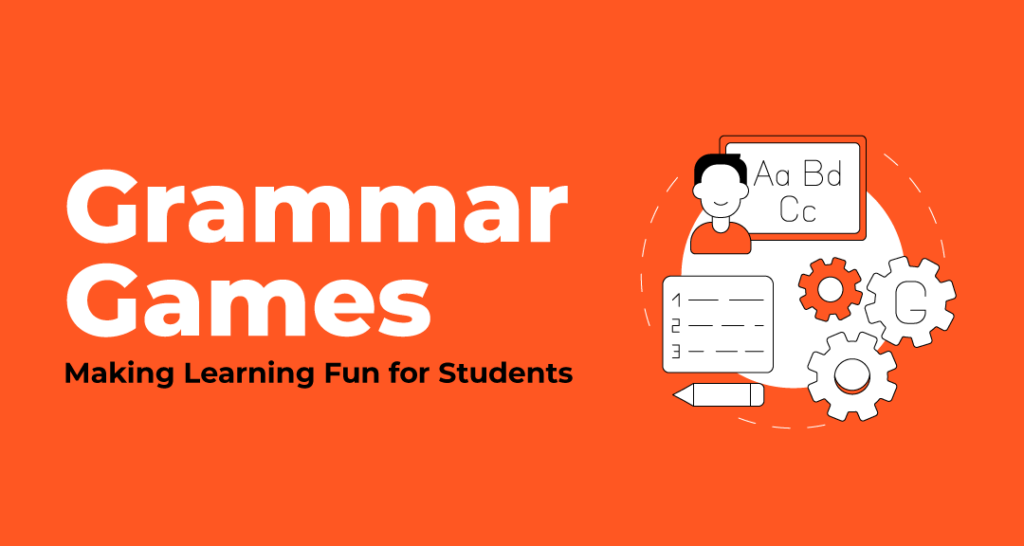Grammar Games: Making Learning Fun for Students
- Teaching
- October 19, 2024
- VOLT Learning

Grammar is the heart and soul of effective human communication. The New Oxford American Dictionary defines grammar as “the whole system and structure of a language or of languages in general.” Undoubtedly, grammar is one of the top human skills of future interest, as grammatical competence helps students read, write, and speak meaningfully in all their lives.
Let’s face it—students find traditional grammar lessons quite boring and monotonous. Because of this, teachers often have difficulty engaging students in the classroom with grammar.
How can teachers transform this often-dreaded part of English into something memorable and fun so that students enjoy it? Grammar games make the entire journey of grammar learning enjoyable and help teachers encourage the active participation of students in the classroom in comparison to the traditional ways of learning.
Benefits of using games in Grammar Instruction
Introducing fun games to students on boring grammar concepts like the usage of verbs, adverbs, nouns, and adjectives is the best possible way to gain grammatical competence. Let’s have a closer look at some key advantages of fun grammar activities:
1. Enhanced Engagement:
Grammar fun games are naturally engaging and play a vital role in creating a positive and low-pressure environment wherein students can feel free to participate actively and retain information more effectively. Games discourage passive listening and promote enhanced engagement by introducing complex grammar rules in a fun way.
2. Active Learning:
Grammar game activities are loaded with lots of fun and creative tricks that compel students to be involved in numerous hands-on practices. Generally, such sessions offer hands-on challenges to students and help deepen their understanding of grammar concepts.
3. Encourages Teamwork and Collaboration:
Inside the classroom, when teachers introduce students to game-based learning experiences on grammar, they instantly foster a sense of teamwork and a collaborative environment where students feel comfortable enough to navigate the twists and turns of English grammar with greater ease while developing essential social skills in addition to language skills.
4. Boosts Confidence:
Many learners find it difficult to master certain grammatical rules. Fun sessions inside the classroom provide these learners with confidence. When they practice grammar rules in a friendly environment, they develop enhanced understanding without fear of judgment. Students experience a boost in their confidence over time and greater fluency in applying grammar rules.
5. Improved Retention:
Studies have shown that interactive activities make students more likely to remember concepts learned. Games allow students to practice and reinforce what they’ve learned, leading to better retention of grammar rules. When students learn through play, they’re more likely to retain concepts, as games often involve repetition and practical application of grammar rules.
Engaging Grammar Games for the classroom: A list for teachers
To get you started, here are a few fun and interactive grammar games that can make grammar lessons the highlight of your classroom:
1. Grammar Bingo
Prepare bingo cards with various grammar terminologies such as nouns, verbs, adjectives, adverbs, etc. Ask others to read out certain sentences or define some terms, and students mark off the correct term in their Bingo cards. This game is helpful for practising parts of speech and important terminology in a competitive setting.
2. Sentence Scramble
Write a few sentences on separate slips of paper and then cut them into individual words. Group students and let them compete to arrange the sentences in a logical sequence. This activity effectively teaches the formation of sentences and concepts of syntax.
3. Verb Charades
For this activity, students become active, where one will act while the rest in class will be required to guess the action the acting student depicts. This can be a fun way to review action verbs and add to the knowledge of terms. You can also change the content of this game to include other features, such as verb tenses.
4. Grammar Jeopardy
Divide by the differing grammar points, such as punctuation, SVO, or past tenses. Arrange questions by degree of difficulty and determine the point score. Students can be asked to answer individually or in groups so that a certain group has to answer right to gain points.
5. Punctuation Relay
Write a paragraph on the board or, if not permitted, on a large sheet of paper without any punctuation marks. Create numerous groups of students and let them swap between running up to add the correct punctuation marks. This game helps pupils learn punctuation within context and practice editing.
6. Speech Bingo
Give a set of words or parts of speech and let students search for them in a specific passage. This game is excellent for developing reading and even recognition skills because the kids have to find certain words or grammar elements determined in the given frame of a playful search. Ensure you read examples and the students put them under the correct part of the speech.
Level Up Grammar Learning with VOLT Learning
Incorporating fun grammar games adds excitement to the classroom environment. Teachers can effortlessly internalize grammar rules for students by turning complex grammar lessons into memorable hands-on experiences. This further helps students boost their confidence in English speaking and improve their literacy, as grammar is the bedrock of literacy.
Teachers planning to introduce fun grammar games in the classroom effectively can explore the VOLT English Grammar and Composition – a NEP-aligned English grammar book for classes 1 to 8. This comprehensive blended course makes grammar interesting and enjoyable. With attention to concepts, vocabulary, understanding and written expression, VOLT English Grammar makes the student an all-round winner.
VOLT English Grammar and Composition is a systematically graded course that introduces grammar concepts in a creative and friendly manner. The simple, jargon-free language of the instructions will make grammar a likeable subject for the children. The course also feature ACTIVE GRAMMAR, NEP-aligned classroom activities and games that bring grammar to life. These interactive exercises engage students in practical, hands-on learning, making grammar both fun and meaningful.



